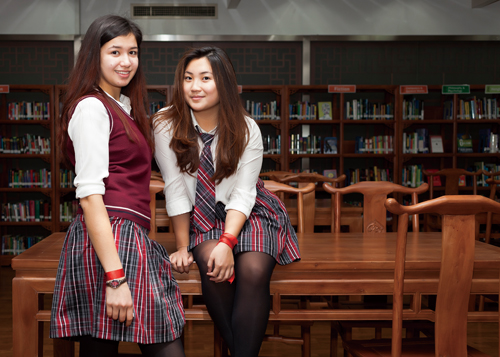
Christmas is the season of gift-giving, indulgence, and plenty, but is also a time to count our blessings. Many of the world’s religions celebrate major festivals during the winter holidays, and the days between Thanksgiving and New Year’s Day are often a period for reflection, gratitude, and resolution-setting. With this in mind, we interviewed three students who founded their own charities about their attempts to bring together like-minded teenagers and help those less fortunate than themselves.
Helen Hong (age 14, American), Grade 9 student at Beijing City International School and founder of Root of the Mind
This year, I did a project on migrant children in Beijing and found that [many of these kids]needed help and we decided to start something to help them get a better education and not have to struggle as much.
At the moment we’re paying for one kid’s Grade 2 tuition in Heilongjiang through Project Hope. The girl we sponsor is a migrant. Her family is originally from Heilongjiang but her dad is out working and her mom has a mental illness, so she lives with her grandma. They don’t have [much of an]income.
We don’t want to just financially support her; we want to understand what her life is like. This way, [we]get to see a different lifestyle that we’re not [experiencing]because we’re in the city and we go to a really nice school. It makes us feel lucky that we have all these facilities and think more about how we can use them as best we can.
Currently, we can only afford to help one child but I’m planning on doing a lot more by contacting the school and communicating directly on what they need and how we can help. [We can better understand] what they need as a whole community instead of just the individual needs of different people.
I’d like to connect [BCIS and the school in Heilongjiang] to each other. We’re looking to send [the school]supplies they need, like clothes and [other daily-use items]. I hope that students at BCIS can sponsor the [migrant children]as a long-term thing.
Last year, we did a sports day with the migrant children and they got to come here for a day to use our gym and play all kinds of sports. Sharing is caring.
We’re currently looking at running events like the BCIS Christmas Bazaar. We’re a team of eight or nine students from Grades 6, 7 and 10 that meet Friday after school for half an hour or so. We meet every other week to talk about things and plan what to do. We’re thinking of selling food – popcorn, drinks, brownies, Christmas stuff – on the day of the bazaar. I have a team of eight or nine people from Grades 6, 7 and 10. I coordinate the group’s activities. Volunteering doesn’t take up very much time. We raised RMB 1,600 from the Halloween party, so our target for the Christmas bazaar is about the same. I really hope people will read this and visit us during the bazaar.
Volunteering is creative. It’s a platform for students to develop any [project]they want to raise money from. They can make things, hold events, or pretty much do anything they can think of.
This semester is almost over. If we make enough money, I could find another student to sponsor at the school [in Heilongjiang]. I could also buy them supplies. RMB 500 [covers the cost of one semester], so it’s really not that much money.
I see people who are struggling. If I have the ability to help them, then why not? I try to really think about how my actions will benefit others now and in the future. After you help someone, you have a gut feeling that “I’ve done something good.” You feel accomplished. If I could teach people one thing, I’d teach them to share what they have.

Saida Mirzalimova and Diana Tyan (age 16, Kazakh), Grade 11 students at the Canadian International School of Beijing and founders of Red Ribbon
Saida: Last year, my father – who lives in Kazakhstan – [paid for]some people with disabilities [to come to]to Beijing for treatment. Three or four families came to Beijing from Kazakhstan. Because they didn’t speak Chinese, it was really hard for them. Diana and I went to visit them at the hospital and help them settle in the city. It was our first charity work; we did that for all of last year. In August, Diana and I decided that we should have our own organization and so we started Red Ribbon.
Diana: We try to go wherever people need our help, be it orphanages, retirement homes, or hospitals. We also thought about getting involved with animal shelters, but it was too much so we decided to focus on people who need our time and energy. Since we [live]in China, we focus on [local work]; when we go back home for the holidays, we want to continue doing charity work in Kazakhstan.
Saida: We began by visiting orphanages. One of the most memorable was The New Hope Foundation (www.hopefosterhome.com), where they help children with disabilities. We went there just to spend time with [the children]. Because of their physical disabilities, it’s harder for them to get adopted. So these children suffer more than others and stay at the orphanage for much longer.
Diana: We got a list of all the orphanages in Beijing and started calling them. Surprisingly, not all of them wanted visitors or students to come. The New Hope Foundation agreed, so we gathered all our Kazakh friends and went there with our Chinese tutor, Linda. We also went to the Shizhentang Hospital (时珍堂中医院) to visit Kazakh and Russian [patients]. Since we understand Chinese, we helped them get around in the city, [interact]with doctors – whatever they needed.
Saida: We took people from different hospitals on trips to the zoo and to Beijing World Park in the south of Beijing.
Diana: Both of us have very happy, healthy, big families. We thought that we should share some of our luck with others who didn’t have [the same]opportunities.
Saida: We [wish we could]do more. We’re currently doing the IB Diploma Programme and after-school activities, so we can only [go on visits to orphanages and hospitals]twice a month.
Diana: We try our best to bring as many people with us [as possible], so we try to organize a time when everyone can come. We have to plan ahead as people have different schedules, so it takes some effort to put it together.
Saida: We went to a talk by Craig Kielburger. He’s the founder of the Free the Children. He inspired us. He said that helping others is the most selfish thing you can do because that’s how you get feelings of kindness and happiness, and bring out positive characteristics in yourself.
Diana: You’re like “Oh my God, I have everything.” I’m not a sentimental person; I don’t cry at movies. But when I went to the orphanage… They’re so poor; they don’t have anything. People don’t really think about poverty but when you actually see it for yourself, then you
realize. The [poor]don’t have a home to live in, blankets to keep warm, or money for treatment. They need the basics.
Saida: Our first notion was that this was about helping people, but meeting with Craig Kielburger gave our project a second wind. We found that [helping others is]really good for us too. If I could teach people one thing, I’d teach them compassion. People aren’t bad; they just don’t know. Join our organization. Contact us, visit our website. We are happy to welcome new volunteers who are willing to help.
Diana: I agree, and I’d also say you have to educate yourself, because if you don’t even know what’s happening around you, you can’t help. Before when I lived in Kazakhstan I really didn’t care about charity. I knew I was lucky, and I knew that people were suffering, but I wasn’t educated enough, and I hadn’t seen actual poverty on the streets. So I think it’s really important to first teach yourself so you can grow as a person.
photos by ELF KID PHOTOGRAPHY and Sui
This article originally appeared on p44-47 of the beijingkids December 2013 issue.
Check out the PDF version online at Issuu.com



